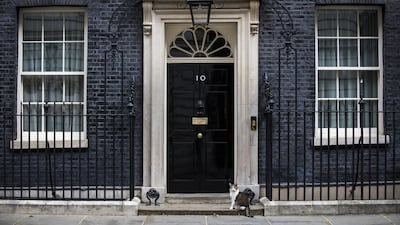The gun for the British Tory party leadership race has been fired but the number of contenders taking up position at the starting line is still growing.
There are currently a dozen Conservative MPs seeking to lead the government after Theresa May steps down as party leader on Friday, with another five MPs rumoured to be considering throwing their hats into the ring.
The names lining up are both prominent cabinet members and backbenchers, from Home Secretary Sajid Javid and former foreign secretary Boris Johnson to Esther McVey. There is one clear dividing line among them. They can be split over how to react to the forces of populism.
One half is adopting the kind of nationalistic approach that is sweeping across much of Europe. Others are trying to emphasise the Conservatives' reputation for being a safe pair of hands by stressing a readiness to listen to and tackle problems facing everyday voters.
It will be a big challenge for the pragmatists to counter the tempestuous mood both in the country at large and among the Conservatives’ 100,000-plus party members. They had a nasty shock when the newly formed Brexit Party outperformed the UK competition in last month’s European election. The Tories only won four seats, a historic low.
There are many sources of the quagmire engulfing British politics. The 2016 Brexit referendum result has not been delivered, a fact that cost Mrs May her job.
Wider pressures on politics were illustrated by one revealing highlight of the Westminster week.
The longstanding British news-focused panel programme Question Time has come under fire in recent years for fuelling the country's increasingly ugly public debate. So it was appropriate that the latest episode featured a question with resonance far beyond London's political arena.
Why, an audience member asked, was everyone so angry about everything, all of the time?
For once, participants in the business of stirring up rancour and despair were spot-on. A Harvard professor of psychology responded by saying differences exploited in an era of populism were actually historic. Stephen Pinker's view was that increasing numbers of people were convinced society is divided by conflict and were picking sides.
This is a shift on the right and the left. "We tend to frame problems as: 'How do we defeat the people who are responsible for them?'" he said.
Another panellist was the international development secretary Rory Stewart, a Tory party leader contender, who came back in a remarkable way. It should first be explained that Mr Stewart is no ordinary politician. The New York Times last week described him as a modern day Lawrence of Arabia seeking to pull off an unlikely coup to capture control of the party. This stems from Mr Stewart's background as an adventurer who walked through Afghanistan as the Taliban regime collapsed in 2001. He then popped up in Iraq during the ill-fated US-led coalition period to administer one of the provinces. After a spell running a charity in Kabul and teaching in the US, he ended up as a Tory MP.
The newest member of Mrs May's cabinet, he grabbed the headlines last week by dusting off his walking boots and heading into towns around the country. He published videos of his chats with members of the public on social media, triggering a wave of viral discussions.
On the TV panel, he declared the antidote to anger was love and politicians needed to embrace it.
How such language goes down with the Conservative membership remains to be seen. Mr Stewart is gambling that he won't go down as a passing political flaneur.
Another of his points was that the driving force of would-be leaders should be mending divides. "One big challenge, above all, is to heal divisions,"he said in an impassioned speech. "We're now split: north against south, Scotland against England, old against young. We've got to find our way to the common ground."
The frontrunners in the race, which is set to drag on into July, largely prefer a debate on a few big choices facing Britain. Mr Johnson has done little outside his newspaper column to define his vision. He has made appeals for low-tax, US-style economic reforms and criticised prison reforms (a job formerly held by Mr Stewart).
Mr Javid has settled on a similar strategy. He has vowed to weather the storm and, like Mr Johnson, bail out of the EU by October.
The current foreign secretary, Jeremy Hunt, has described that option as political suicide for the Conservatives. Mr Hunt is from the managerial camp and stresses his history as an entrepreneur in an effort to build confidence. The majority of the crowded field have committed to jockeying with similarly blue-sky options on Brexit, taxes or law and order.
Brexit has sent Britain's two major parties into a tailspin. The opposition Labour party is floundering after leading members, including loyalist and former spin doctor Alistair Campbell, voted for other parties in the European election.
Under those circumstances, the febrile mood might well be impervious to even Mr Stewart's fervent love-bombing.

